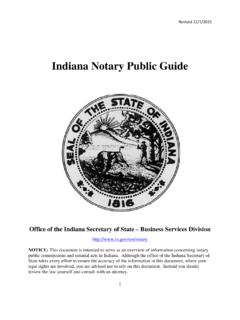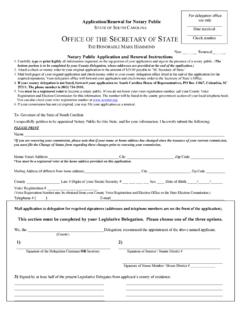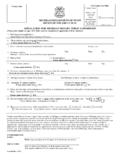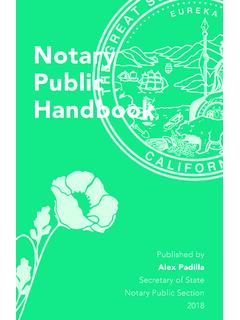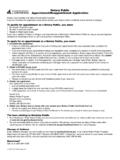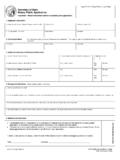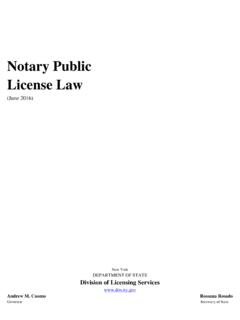Transcription of Utah Notary Public Study Guide and Handbook
1 Utah Notary Public Study Guide and Handbook Office of the Lieutenant Governor 350 N State Street, Suite 220 Salt Lake City, UT 84114 (801) 538-1041 1 Table of Contents Becoming a 2 o 2 o How to use 2 o Taking the 3 Top ten mistakes made by 4 New laws 2017 and what they mean to the 10 Examples of Notarial 15 o 16 o 17 o Copy 18 o Credible Witness 19 o 20 o Signature 21 o Corporate 22 Utah Code Annotated Title 46 Chapter 1 Notaries Public 23 5 Steps To Completing a Correct Notarization of a 33 2 Becoming a Notary Qualifications: 1. Must be at least 18 years old 2. Must lawfully reside in the State of Utah for at least 30 days prior to applying 3. Must be able to read, write and understand English 4. Must be a US citizen, or have permanent resident status under Section 245 of the Immigration and Nationality Act 5.
2 Have not been Revoked or Suspended as a Notary without expressed permission from the Office of the Lieutenant Governor 6. Must list any criminal convictions to be reviewed by the Office of the Lieutenant Governor 7. Pass test 8. Pay $55 Administration fee and $40 Test fee (after taking test) 9. Obtain Notary Bond 10. Submit the Application, Bond and Oath of Office to the Office of the Lieutenant Governor How to use to become a Notary : 1. Create an account 2. Create a username and password 3. Enter your email, name, phone number a. Keep in mind the name you use when creating your account will be as it appears on your commission and stamp 4. Confirm email address 5. Add middle name (optional) and date of birth 6. Enter your home address, mailing address (if different than home address), and business name and address. a. The business address will be made Public on Notary search.
3 7. Enter phone numbers a. Work Phone will be made Public on Notary search. If there is no work phone, your home or cell phone will default to Public search. 8. Answer Qualification questions a. If any of the qualifications listed above are not answered in accordance with UCA Title 46 Chapter 1, you will not be permitted to proceed with online application. 9. Review your application. If everything is correct you will then proceed with taking the Taking the Test: There are 35 questions of which 10 are worth 4 points and 25 are worth 1 point making a total of 65 points possible. You must pass with 61 points or higher in order to apply for your Notary commission. If you do not pass the test, you have 30 days from the date you first took the test to take it again for $40, after 30 days you will be required to pay the Administrative fee and testing fee of $95. 4 Top Ten Mistakes of Notaries Public : Preparation for 4-point FUNDAMENTAL questions 1.
4 Leaving out the notarial language 2. Confusing the notarial acts 3. Misinterpreting electronic signature/notarization 4. Failing to require Personal Appearance 5. Failing to name the appearing signer 6. Adopting policies contrary to UCA 46-1- 8 7. Failing to require proper 8. Refusing documents solely for their content 9. Leaving the Notary seal and certificate with the employer upon termination of employment 10. Executing materially incomplete certificates 1. Leaving out the notarial language: Never just stamp and sign. Make sure the proper language, with all necessary material information, is included in the written description of the notarial act (also called a notarial certificate ). UCA 46-1- 6 lists only five options of notarial acts three of which deal with notarizing a signature. The definitions of Acknowledgment, Jurat and Signature Witnessing in 46-1- 2 describe the information to which the Notary is required to certify.
5 None of the acts listed in this section of code (46-1-6) are defined as signature and seal alone. To Review: When notarizing a signature, ALWAYS use some variation of one of the two acts below (also found at ) Acknowledgment Jurat State of Utah County of Salt Lake On this 1st day of July, in the year 2010, before me, ( Notary name), a Notary Public , personally appeared, John Doe (signer name) , proved on the basis of satisfactory evidence to be the person(s) whose name is subscribed to this instrument, and acknowledged he executed the same. Witness my hand and official seal. Notary Name Signature State of Utah County of Salt Lake Subscribed and sworn to before me on this 1st day of July, 2010 by John Doe (signer name). Notary Name Signature 5 Reference: 46-1- 6. Powers and limitations. The following notarial acts may be performed by a Notary within the state: (1) Jurats (2) Acknowledgements (3) Signature Witnessing (5) Copy Certifications (4) Oaths or Affirmations.
6 Reference: 46-1-9 False or incomplete certificate. A Notary may not execute a certificate containing a statement known by the Notary to be false or materially incomplete. 46-1- 16 Official Seal. A Notary may not use a notarial seal independent of a notarial certificate. 2. Confusing the notarial acts: Please see the subtle differences between the Jurat, Acknowledgment and Signature Witnessing. Jurat certifies that a voluntary signature was made in the Notary s presence under an oath or affirmation, Acknowledgment certifies that a signer has admitted in the Notary s presence to voluntarily signing a document, and Signature Witnessing certifies that a voluntary signature was made in the Notary s presence. All 3 require personal appearance, and proof of identity. Reference: 46-1- 2(1) Acknowledgment means a notarial act in which a Notary certifies that a signer, whose identity is personally known to the Notary or proven on the basis of satisfactory evidence, has admitted, in the presence of the Notary , to voluntarily signing a document for the document's stated purpose.
7 Reference: 46-1- 2(5) Jurat means a notarial act in which a Notary certifies that a signer, whose identity is personally known to the Notary or proven on the basis of satisfactory evidence, has made, in the Notary 's presence, a voluntary signature and taken an oath or affirmation vouching for the truthfulness of the signed document. Reference: 46-1- 2(13) Signature Witnessing means a notarial act in which an individual: appears in person before a Notary and presents a document; provides the Notary satisfactory evidence of the individual s identity or is personally known to the Notary ; and signs the document in the presence of the Notary . 3. Misinterpreting electronic signature/notarization: Notarization of an electronic signature IS VERY RARE and still requires personal appearance. It is a certification of a voluntary signature just the same as any other signature.
8 Notarization of an electronic signature does NOT mean by phone, fax, email or video conference. For electronic notarization, the signer is in the presence of the Notary using a computer instead of pen and paper. The rule of personal appearance is not affected by the definition of Electronic Signature 6 Reference: 46-4- 102(8): "Electronic signature" means an electronic sound, symbol, or process attached to or logically associated with a record and executed or adopted by a person with the intent to sign the record. 4. Failing to require Personal Appearance: The signer must always appear before the Notary . Title 46 does not allow for variation on this matter. Many fraud cases begin with stories of why the signer cannot personally appear: He is too ill to come into the office; The signer is my grandmother and she asked me to get this notarized; You ve been my friend for years you know I wouldn t lie to you.
9 As convincing as these statements can be, none of them justify notarizing the signature without the signer personally present. Reference: 46-1- 2 (Definitions of Acknowledgment, Jurat and Signature Witnessing) 5. Failing to name the appearing signer: If John Doe appears before you, you must certify John Doe appeared before you (it seems simple enough, but many notaries actually forget to name the signer). When more than one signature appears on the document, omitting this material information often leads to confusion. Many fraud cases show that the defrauder was able to add a different name in the Jurat or Acknowledgment simply because the Notary failed to include the correct name in the first place. Correct Incorrect State of Utah County of Salt Lake Subscribed and sworn to before me on this 1st day of July, 2010 by John Doe. Notary Name Signature State of Utah County of Salt Lake Subscribed and sworn to before me on this 1st day of July, 2010 by Notary Name Signature Reference: 46-1-9 False or incomplete certificate.
10 A Notary may not execute a certificate containing a statement known by the Notary to be false or materially incomplete. (underline added) 6. Adopting policies contrary to UCA 46-1-8: According to law, a Notary may not refuse to enter into a lawful transaction involving a notarial act. Do not adopt policies to refuse transactions unless there is a legal reason to do so. To pick and choose who is served 7 based on personal preferences or prejudices is not legally justified. Some employers have expressed concern over this law. It is true, employers often carry the burden in finding a balance that complies with the law and, at the same time, allows for reasonable limits to protect the Notary s time and liability. Regardless, all policies should be carefully created while keeping in mind the Notary s main purpose: to serve the Public not just the company. Reasonable limits may and should be in place to prevent abuse from members of the Public who would demand immediate service regardless of the Notary s workload and availability.

